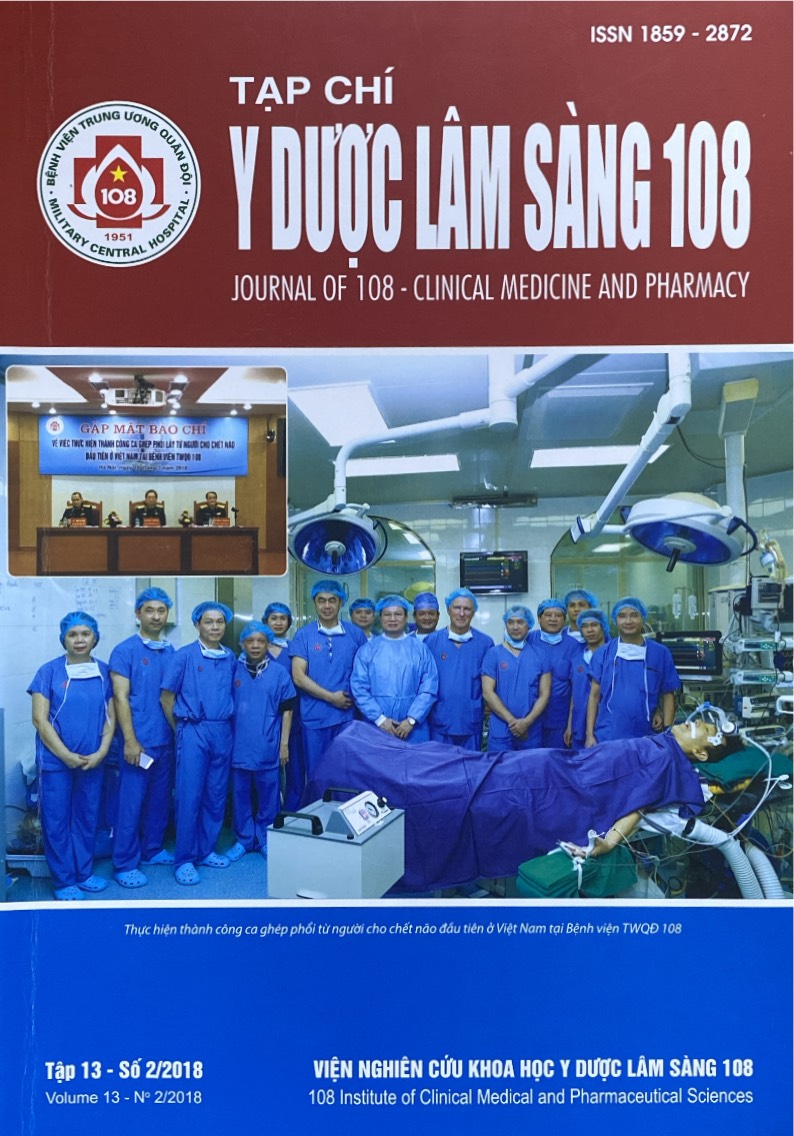The relationship between major histocompatibility complex (HLA-B27, HLA-Cw06, HLA-DR7) and psoriatic arthritis
Main Article Content
Keywords
Abstract
Objective: To identify the rate of major histocompatibility complex (MHC) in psoriatic arthritis (PsA). To compare the rate of MHC between the psoriatic arthritis group carrying plaque psoriasis (PPs) and control group. Subject and method: Prospective and cross-sectional study were conducted at Ho Chi Minh City Hospital of Dermato-Venereology from January 2016 to March 2017. Among 40 PsA patients qualified for CASPAR criteria, 37 patients with PPs agreed to participate the treatment group. 33 subjects in the control had no arthritis and psoriasis. Both groups had similar ratio of gender and age, tested for HLA-B27, HLA-Cw06, HLA-DR7 by Sequence Specific Polymerase Chain Reaction (SSP-PCR), and HLA serotyping assay HLA-B and HLA-C by DNA sequencing to find the relationship between the rates of MHCs in PsA patients. Result: The HLA-B27 ratio in PsA was 32.5%, PPs was 18.92%, the control group was 9.09%. The rate of HLA-Cw06 in PsA was 7.5%, PPs was 18.92%, the control group was 3.03%. The rate of HLA-DR7 in PsA was 32.5%, PPs was 27.30%, the control group was 24.24%. PsA patients carrying HLA-B27 had higher risk of PsA with RR = 1.6. PsA with HLA-B27(+) was at risk for severe arthritis. PsA patient with HLA-Cw06(+) had early onset and rapid transient time from PPs to PsA. PsA with HLA-DR7(+) delayed the progression from PPs to PsA. Conclusion: HLA-B27 is associated with PsA. PsA with HLA-B27(+) has a higher risk of severe arthritis, PsA with HLA-Cw06(+) associated with early onset PsA, and PsA with HLA-DR7(+) delayed progression from plaque psoriasis to PsA.
Article Details
References
2. Danafa D, Gladman DD, Verton T (1995) The role of HLA antigens as indicators of disease progression in psoriatic arthritis. American College of Rheumatology 38(6): 845-850.
3. Woodrow JC, Ilchysyn A (1995) HLA antigens in psoriasis and psoriatic arthritis. Journal of Medical Genetics 22: 492-495.
4. FitzGerald O, Haroon M, Giles JT et al (2015) Concepts of pathogenesis in psoriatic arthritis: Genotype determines clinical phenotype. Arthritis Res Ther 17: 115.
5. Queiro-Silva R, Torre-Alonso JC, Tinture T et al (2004) The effect of HLA-DR antigens on the susceptibility to, and clinical expression of psoriatic arthritis. Scand J Rheumatol 33: 318-322.
6. Chen L, Tsai TF (2016) HLA-Cw6 and psoriasis. Br J Dermatol, Oct 2016; Available from:
http://www.ncbi.nlm.nih.gov/pubmed/29072309.
7. Hamilton ML, Gladman DD, Shore A et al (1990) Juvenile psoriatic arthritis and HLA antigens. Annals of the Rheumatic Diseases 49: 694-697.
8. Rahman P, Elder JT (2012) Genetics of psoriasis and psoriatic arthritis: A report from the GRAPPA 2010 Annual Meeting. J Rheumatol 39(2): 431-433.
9. Dafna D, Gladman DD, Karen AB et al (1986) HLA antigen in psoriatic arthritis. The Journal Rhematology 13(3): 686-693.
10. Winchester R, Minevich G, Steshenko V et al (2012) HLA associations reveal genetic heterogeneity in psoriatic arthritis and in the psoriasis phenotype. Athritis & Rhematism 64(4): 1134-1144.
 ISSN: 1859 - 2872
ISSN: 1859 - 2872
